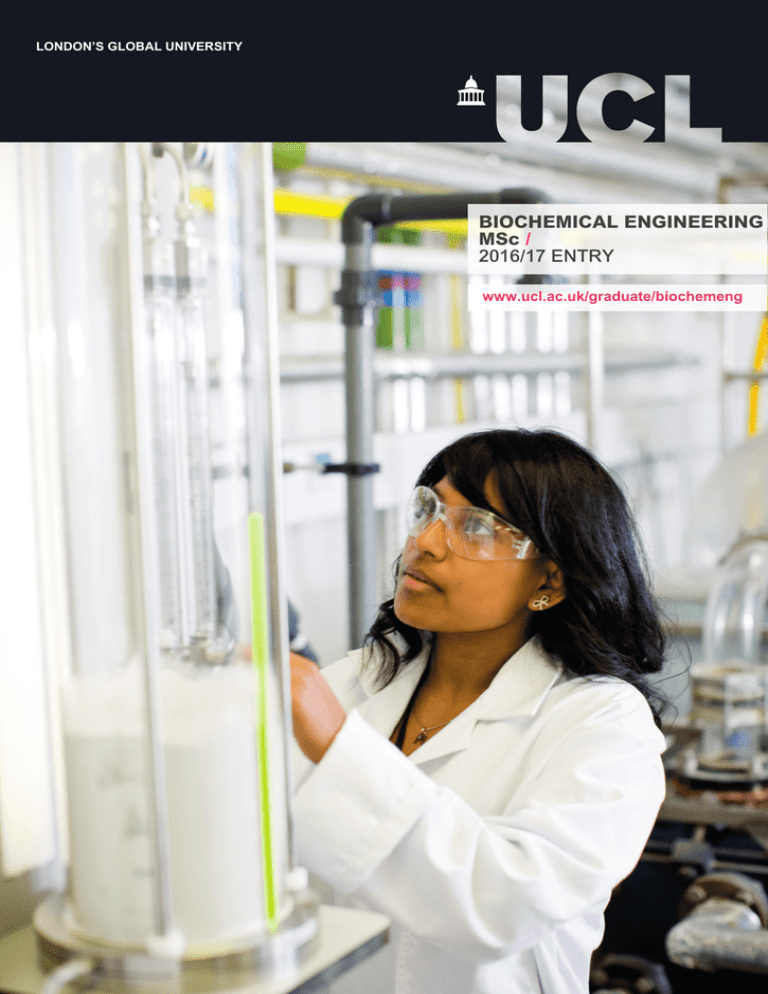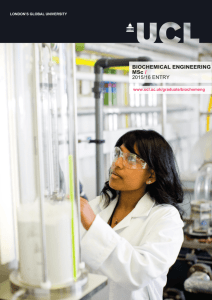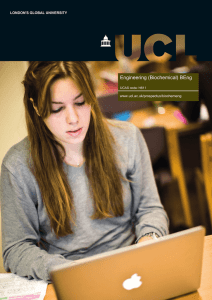BIOCHEMICAL ENGINEERING MSc / 2016/17 ENTRY
advertisement

LONDON’S GLOBAL UNIVERSITY BIOCHEMICAL ENGINEERING MSc / 2016/17 ENTRY www.ucl.ac.uk/graduate/biochemeng Biochemical Engineering MSc / This MSc analyses how advances in the life sciences can effectively be translated into real outcomes of benefit to all. Close links with the research activities of the Advanced Centre for Biochemical Engineering ensure that lecture and case study examples are built around the latest biological discoveries and bioprocessing technologies. Degree structure Mode: Full-time: 1 year Students undertake modules to the value of 180 credits. The programme offers three different pathways (for graduate scientists, engineers, or biochemical engineers) and consists of core taught modules (120 credits) and a research or design project (60 credits). A Postgraduate Diploma (120 credits, full-time nine months) is offered. CORE MODULES FOR GRADUATE SCIENTISTS // Degree summary Students develop an advanced knowledge of core biochemical engineering principles and applications, design techniques for the creation of products and process plants to meet a defined need, commercial and economic aspects, health, safety, sustainability, environmental and other professional issues, management and business practices, and techniques applicable to research and advanced scholarship. Bioprocess Synthesis and Process Mapping; Heat and Mass Transfer in Bioprocesses; Fluid Flow and Mixing in Bioprocesses; Advanced Bioreactor Engineering; Integrated Downstream Processing; Commercialisation of Bioprocess Research; Mammalian Cell Culture and Stem Cell Processing; Bioprocess Validation and Quality Control CORE MODULES FOR GRADUATE ENGINEERS // Cellular Functioning from Genome to Proteome; Metabolic Processes and Regulation; Structural Biology and Functional Protein Engineering; Advanced Bioreactor Engineering; Integrated Downstream Processing; Commercialisation of Bioprocess Research; Mammalian Cell Culture and Stem Cell Processing; Bioprocess Validation and Quality Control Core Modules for graduate biochemical engineers // Industrial Synthetic Biology; Sustainable Bioprocesses and Biorefineries; Cell Therapy Biology; Bioprocessing and Clinical Translation; Bioprocess Systems Engineering; Bioprocess Microfluidics; Vaccine Bioprocess Development; Bioprocess Validation and Quality Control Three distinct pathways are offered designed for graduate scientists, engineers, or biochemical engineers. DESIGN OR RESEARCH PROJECT // UCL Biochemical Engineering is the largest of its kind in the UK. Our graduate programmes are internationally recognised and draw on advances in life sciences and the core discipline of biochemical engineering. // // We maintain close teaching and research links with other highly-rated UCL departments and with experts from other departments throughout the UK and overseas, and are also involved in exceptionally close collaborations with industry. // The content of the MSc programmes is closely linked to the department’s post-experience MBI® Training Programme. Scientists and engineers already working in the bioindustry participate in the MBI® programme to update their knowledge on particular aspects of biochemical engineering, or to work towards a Master’s qualification. Delegates from nearly 200 companies have benefited from such training and sit alongside the full-time Master’s students for a number of the programme elements while over 50 leading industrialists contribute to the teaching activities. Industrialists engaged upon MBI® training activities come from all over the world providing unique networking opportunities. The programme is delivered through a combination of lectures, tutorials, and individual and group activities. Invited lectures delivered by industrialists provide a professional and social context. Assessment is through unseen written examinations, coursework, individual and group project reports, individual and group oral presentations, and the research or design project. All MSc students submit a 10,000-word dissertation in either Bioprocess Design (science graduate pathway) or Bioprocess Research (engineering and biochemical engineering graduate pathway). Your career The first destinations of those who graduate from the Master's programme in Biochemical Engineering reflect the highly relevant nature of the training delivered. UCL biochemical engineers are in demand, due to their breadth of expertise, numerical ability and problem solving skills. Approximately three-quarters of candidates elect to take up employment in the relevant biotechnology industries while the remainder follow careers in the management, financial or engineering design sectors. Approximately half of those who choose the bioindustry sector will undertake PhD or EngD programmes in biochemical engineering either at UCL or other universities before commencing their industrial careers. Recent career destinations* include: // // // // // Uthman Dan Fodiyo University, Academic Teacher, 2013 Maple Leaf, Process Analyst and Design Engineer, 2013 3M, Biomedical Engineer, 2013 UCL, EngD Research Engineer, 2013 Bio Pharma Services, Product Manager, 2013 Employability The department places great emphasis on its ability to assist its graduates in taking up exciting careers in the sector. UCL alumni, together with the department’s links with industrial groups, provide an excellent source of leads for graduates. Over 1,000 students have graduated from UCL with graduate qualifications in biochemical engineering at Master’s or doctoral levels. Many have gone on to distinguished and senior positions in the international bioindustry. Others have followed independent academic careers in universities around the world. A few examples of our latest graduates are given here. * data taken from the ‘Destinations of Leavers from Higher Education’ survey undertaken by HESA looking at the destinations of UK and EU students in the 2010–2012 graduating cohorts six months after graduation and, where necessary, departmental records. Entry requirements Normal entry requirements are at least a second-class Bachelor's degree from a UK university or the equivalent from an approved overseas institution. Candidates offering recent industrial experience are also encouraged to apply. As with any engineering discipline numeracy skills are important for the quantitative description of biological and physical phenomena. Evidence of numerical ability is requested as either an A level in Mathematics (or in exceptional cases, in Physics) or some mathematics studied at university. The department provides mathematics tutoring for Master's students throughout the year adjusted to a candidate's ability. FEES AND FUNDING // UK & EU (2016/17) entry: £11,090 (FT) // Overseas (2016/17) entry: £23,440 (FT) Full details of funding opportunities can be found on the UCL Scholarships website: www.ucl.ac.uk/scholarships APPLICATION DATE All applicants: 29 July 2016 CONTACT English language proficiency level Dr Daniel Bracewell If your education has not been conducted in the English language, you will be expected to demonstrate evidence of an adequate level of English proficiency. Email: d.bracewell@ucl.ac.uk Telephone: +44 (0)20 7679 9580 The level of English language proficiency for this programme is: Standard. Information about the evidence required, acceptable qualifications and test providers is provided at: www.ucl.ac.uk/graduate/english-requirements Your application The deadline for all applicants is 29 July 2016. Students are advised to apply as early as possible due to competition for places. Those applying for scholarship funding (particularly overseas applicants) should take note of application deadlines. When we assess your application we would like to learn: // // // // why you want to study Biochemical Engineering at graduate level // how will the MSc help you in your future career aspirations why you want to study Biochemical Engineering at UCL what particularly attracts you to this programme how your academic, professional and personal background meets the demands of a challenging programme. We are particularly interested in any individual or group research project that you have undertaken. Together with essential academic requirements, the personal statement is your opportunity to illustrate whether your reasons for applying to this programme match what the programme will deliver. Details on how to apply are available on the website at: www.ucl.ac.uk/graduate/apply PDF Updated: May 25, 2016 Information correct at time of going to press. See website (www.ucl.ac.uk/biochemeng) for latest information




